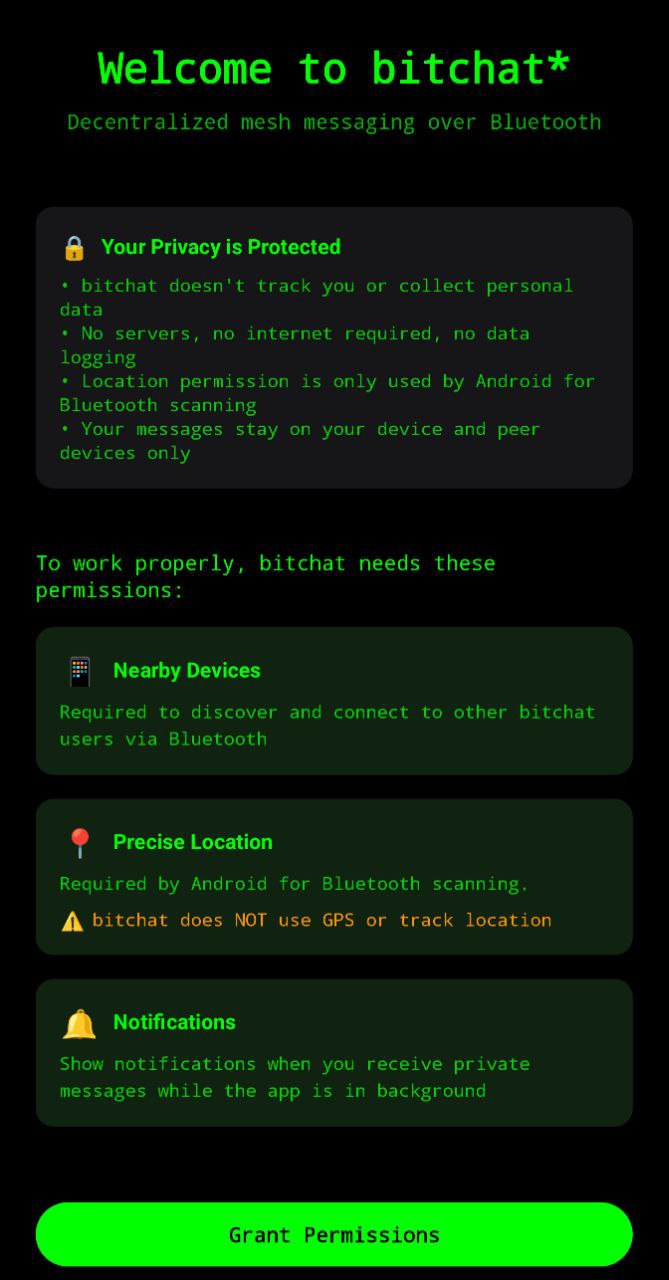Say Hello Without a Network — BitChat Makes It Possible.
 Aman Srivastav
Aman SrivastavJack Dorsey’s BitChat lets you message without the internet — revolutionizing privacy, disaster response, and offline communication in 2025 through encrypted Bluetooth mesh networking.
In today’s digital world, data privacy is constantly under threat. Popular messaging apps like WhatsApp, Telegram, and even Signal, though encrypted, still rely on centralized servers. This opens doors to censorship, surveillance, and data leaks.
Enter BitChat—a decentralized, peer-to-peer messaging solution designed to empower users with true privacy, data ownership, and freedom from central authority.
What is BitChat?
BitChat is a peer-to-peer encrypted chat system that runs without a central server. Instead of storing messages on company servers, it uses a decentralized network to transfer messages between users.
Some versions of BitChat are built on BitMessage, while others are tied to blockchain technologies.
👉 BitChat = No middleman, no data leaks.
There are different implementations:
Classic BitChat – built on BitMessage, a P2P encrypted message protocol.
Web3/Blockchain-based BitChat – sometimes integrated with wallets and token systems.
Core Features:-
✅ End-to-End Encryption: Messages are secured and can only be read by the sender and receiver.
🔗 Peer-to-Peer (P2P): No central server or storage — messages go directly between users.
👤 User Identification via Public Keys: No phone numbers needed.
💬 Anonymous Chat: No real names or email addresses required.
📁 File Transfer Support: Secure file sharing (in some versions).
🧠 No Metadata Leakage: Unlike centralized apps, it hides who’s talking to whom.
Technology Behind BitChat:-
Depending on the version, BitChat may use:
BitMessage Protocol: A decentralized message broadcast protocol (like email, but encrypted and anonymous).
Blockchain (Web3 version):
May use smart contracts for user registration
Could use a native token for in-app actions
IPFS or Distributed Hash Tables (DHT) for file sharing
Cryptographic Algorithms: ECC, AES-256, or RSA for encryption
Built with: Some clients use Python (BitMessage), others may use React, Node.js, Web3.js, or even Electron.
Privacy and Security:-
Decentralized Encryption
Every message is encrypted end-to-end.
Since there's no central server, no government or hacker can mass-monitor messages.
🕵️ Anonymous Communication
No mobile numbers or emails.
Communicate using cryptographic identities (e.g., public keys).
🛡️ Resistant to Censorship
- Governments or ISPs cannot easily block BitChat because there’s no central point of failure.
Comparison:
| Feature | Signal | BitChat | |
| Central Server | Yes | Yes | No |
| E2E Encryption | Yes | Yes | Yes |
| Open Source | Partially | Yes | Mostly |
| User Identity | Phone | Phone | Public Key |
Pros and Cons:-
Pros
100% decentralized — no central control.
Maximum privacy and encryption.
No personal data required.
Resistant to surveillance and censorship.
Open source (usually).
❌ Cons
Not widely adopted yet.
Interface may not be user-friendly.
Slower message delivery in some P2P setups.
Might not have features like voice/video calls.
Requires basic understanding of cryptography for full use.
Use Cases:-
💬 Privacy Enthusiasts – For users who want total control of their messages.
🧑⚖️ Activists & Journalists – Safe from surveillance or government intervention.
🏢 Remote Teams – Teams that require secure internal communication.
🌐 Crypto Communities & DAOs – Integrates well with Web3 values of decentralization.
🧠 Developers & Open Source Advocates – Ideal for those who value transparency.
Future Potential:-
🌍 Mainstream Adoption: If privacy laws tighten, apps like BitChat could gain more attention.
🔐 Integration with Web3: Wallets, tokens, and identity verification without central authority.
🤖 AI & Decentralized Communication: Imagine bots or AI assistants built on private infra.
📱 Mobile-First Versions: A polished mobile app can be a game-changer.
🏛️ Decentralized Identity (DID): BitChat could help form the foundation of identity-less communication.

Bitchat architecture overview. Source: Github
Subscribe to my newsletter
Read articles from Aman Srivastav directly inside your inbox. Subscribe to the newsletter, and don't miss out.
Written by

